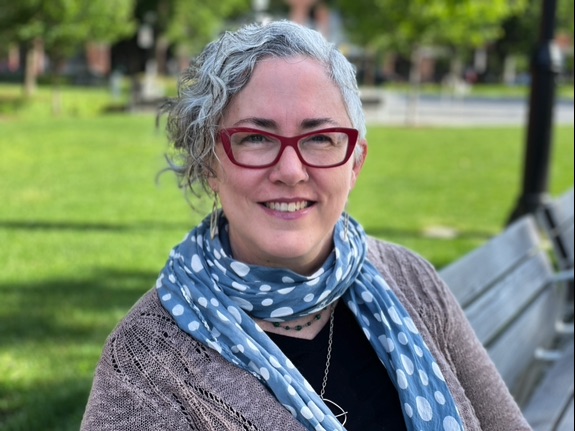Photo by Todd R. Lockwood
Watch a video of the Prize presentation event
courtesy Media Factory
A tribute to poet Kerrin McCadden by author Stephen P. Kiernan
In her poem Second Cut – which is about haying, but manages to be about many other things as well – this year’s winner of the Herb Lockwood Prize provides a definition of a poem:
... a thing full of blackbirds bolting from the maple, hermit thrushes, always in pairs, first one, then the second, that hawk sailing over it all, this day so hot, it’s like a painting.
That definition accurately describes this poet’s verses, too: humble but energetic, keenly aware of nature, mindful of what might be soaring overhead. And all of it informed by the escaping blackbirds of imagination.
This year’s winner went to St. Michael’s College, and promptly flunked out. After a stint at Middlesex Community College in Massachusetts, she returned to St. Mike’s and graduated on the dean’s list. Later she earned a master’s degree in fine arts from Warren Wilson College.
Her work has appeared in American Poetry Review, the Academy of American Poets Poem-a-Day series, Beloit Poetry Journal, The Collagist, Failbetter, Four Way Review, Green Mountains Review, Hunger Mountain, New England Review, Painted Bride Quarterly, PANK, Ploughshares, Poet Lore, Prairie Schooner, Pratik: A Magazine of Contemporary Poetry (published in Nepal), Rattle, The Salon, Sixth Finch, SWWIM and Tinderbox. Probably there are more.
The length of this list might convince you that this writer is prolific, but her body of work is not immense: a chapbook called Keep This to Yourself, the collection Landscape with Plywood Silhouettes, and her latest, American Wake. Yet the acclaim she has received would seem more fitting for someone with twice as many books: a National Endowment for the Arts literature fellowship, inclusion in Best American Poetry 2012, winning the inaugural Vermont Book Award, and this year qualifying as a finalist for the Vermont Book Award and the New England Book Award. Two of her poems were included in Roads Taken: Contemporary Vermont Poetry, the excellent collection edited by Vermont poets laureate Chard deNiord and Sydney Lea. (This book, by the way, demonstrates the astonishing poetry being written in Vermont these days, especially by women. Get your hands on this one, Roads Taken.)
What are her poems like? They blend muscular directness with apt metaphors. A poem about, perhaps, an ex-lover, begins this way:
Dear train wreck, dear terrible engines, dear spilled freight,
dear unbelievable mess, all these years later I think
to write back.
The emotion of these lines occurs with incredible density – disdain for the person, symbolism for the damage that happened, and some new feeling that makes the poem possible.
Too much contemporary poetry is secretive, opaque, rendered in a private language. Not this year’s prize winner. She writes poems that seek to be understood. That is especially true in her book American Wake, its title a play on the Irish Wake. This book concentrates on two themes that in hands with lesser skills would be sentimental, and in this case lead to everything from epiphany to heartbreak: a return to her family’s origin lands in Ireland, and the death of her brother from a drug overdose.
Isn’t it time, unfortunately, for American culture to have a poetry about opiates? One that is courageous and strong? And isn’t the search for home and history part of how we reckon with the strangeness and displacement of these times? These poems wrestle with difficulty, and do not always find joy. But they do discover, and enlighten, and name with fierce precision. The heart of her work is serious in a way we cannot resist and cannot help admiring. Here is a portion of her poem Weeks After My Brother Overdoses, which manages to be both personal and societal simultaneously:
I keep thinking, I am not a sister anymore. ...
No one will let me have my sadness, or tally
what I’ve lost. I make lists like recipes for how to go on alone.
I draw his death when I doodle, making little crime scenes,
as if this epidemic were a murderer, a suspect, a criminal.
I draw him on the sidewalk to inflate the numbers, to give
my brother to everyone. Inside the outline, I do some math.
I add him to seventy-two thousand, and subtract him from me.
Excellence has been a hallmark of every winner of the Herb Lockwood Prize. That is one of the key criteria, that this person performs her art at the highest level of quality. The other essential ingredient is that this person has not worked for herself, only, but has inspired and uplifted and used the arts to create community.
This year’s winner has done precisely that, by teaching for twenty-nine years at Montpelier High School, and now at The Center for Technology in Essex. This profession is notable for many reasons. First, with her credentials, she could be a college professor. Instead, she has chosen to work with writers earlier in their development, when they are fledglings. The newness of their work, and their hopes, requires nurturing, empathy, a light touch. Second, teaching is a tough business these days, from the challenges of remote learning, to the many nonacademic needs that students bring with them to school, to the recent attacks by archconservative media on classes and schools that accept students as they are.
But when her automotive tech kids stay late in class, because they are all enraptured by the books they are reading, she goes to social media to crow about the joyful rewards of enlarging young minds.
In honor of the works her many blackbirds have created, and in recognition of the many poems we hope lie ahead, on this the ninth year of the Herb Lockwood Prize, we are proud to award it in 2022 to a singular talent and a Vermont treasure, Kerrin McCadden.
2022 Winner
Kerrin McCadden


